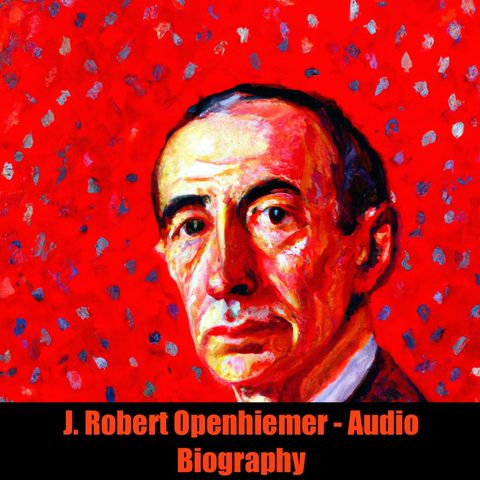Robert Openhiemer - Audio Biography

Download and listen anywhere
Download your favorite episodes and enjoy them, wherever you are! Sign up or log in now to access offline listening.
Robert Openhiemer - Audio Biography
This is an automatically generated transcript. Please note that complete accuracy is not guaranteed.
Description
J. Robert Oppenheimer: The Architect of the Atomic Bomb J. Robert Oppenheimer (1904-1967) was an eminent American theoretical physicist who made seminal contributions to the development of modern physics in...
show moreJ. Robert Oppenheimer (1904-1967) was an eminent American theoretical physicist who made seminal contributions to the development of modern physics in the early 20th century. However, he is best known as the scientific director of the Manhattan Project - the United States' secret program during World War II that developed the world's first atomic bombs. After the war, Oppenheimer became a chief advisor to the newly created Atomic Energy Commission and devoted himself to international control of atomic energy and blocking the nuclear arms race with the Soviet Union. Still, his pivotal role in creating the ultimate weapon of mass destruction would forever associate him primarily as the architect behind the devastating power of the atomic bomb.
Growing Up in New York's Intellectual Circles
Born in New York City in 1904 to German Jewish immigrant parents, Oppenheimer grew up in an elite cultural environment encouraged by his father's successful textile import business. Young "Robert" retreated often to the family library absorbing classic world literature and learning four languages, though he struggled to relate to peers in school. As an undergraduate attending Harvard, he impressed leading physicists like J.J. Thomson before pursuing graduate study overseas under iconic physics giants like Max Born and Niels Bohr who became influential lifelong mentors. Oppenheimer also pursued Eastern philosophy like yoga and Buddhism which contributed to unorthodox teaching methods later known for stimulating students to think independently outside rigid calculations.
Groundbreaking Discoveries in Theoretical Physics
Returning to the US in 1929 to teach physics at Berkeley and Caltech, Oppenheimer distinguished himself as an approachable but intensely rigorous instructor who could simplify complex quantum concepts innovatively. His prolific theoretical research and publications also earned respect of luminaries like Albert Einstein and Enrico Fermi for reconceptualizing cosmic ray showers. As Berkeley Radiation Laboratory director, Oppenheimer attracted and nurtured a cadre of young physicists creating a nexus between European advances and American innovation.
When WWII broke out, expert administrators organizing Allied atomic weapons research quickly recognized Oppenheimer's talent for managing meticulous interdisciplinary teams on nearly impossible deadlines. His uncommon leadership was known for reconciling clashing expert egos into cooperative knowledge sharing. Accordingly, the Manhattan Project's creators selected Oppenheimer to spearhead its hub science laboratory in secret New Mexico wilderness.
Head of the Manhattan Project
On July 16, 1945, Oppenheimer oversaw the very first nuclear weapon test code-named "Trinity" at Los Alamos - an unforgettable moment searing his conflicted legacy into history as he watched his own creation unleash the power of a miniature Sun. A few weeks later when the destruction of Hiroshima and Nagasaki forced Japan's surrender, he reflected solemnly: "Now I am become Death, the destroyer of worlds" - a quote from Hindu scripture Bhagavad Gita.
While many scientists left project home bases like Los Alamos after the war feeling lasting regret, Oppenheimer continued advising Presidents on atomic energy matters given his unparalleled experience. As Chairman of the General Advisory Committee to the Atomic Energy Commission for 7 years, he controversially opposed developing the far more devastating hydrogen fusion bomb. Since the Soviets lacked atomic weapons then, he argued such massively increased threats unnecessary for reasonable deterrence. These battles aggravated FBI agents already suspicious of Oppenheimer's prewar liberal activism consorting with suspected communists.
The Security Hearing and Scapegoating
In 1953 at the height of McCarthyist witch hunts, Oppenheimer endured a humiliating trial questioning his loyalty on bogus charges which ended security clearances critical for his advisory role. False testimonies amplified decade-old leftist ties into a treasonous conspiracy to deny him influence against the H-bomb's sudden development. Once the country's most distinguished scientist, the broken Oppenheimer emerged as a devastated pariah used as a scapegoat by hawkish agendas. Stripped of credentials facilitating insider dissent, he watched military strategists promote suicidal "winnable" nuclear war mentalities against Russia throughout the 1960s while silenced into exile from the research community he pioneered.
Legacy as Tragic Figure
Today Oppenheimer stands among the most intellectually brilliant yet emotionally enigmatic figures behind dueling atomic legacies - scientific ingenuity with lethal consequences. Historians debate whether the mission-focused Oppenheimer felt genuine guilt over Japan's bombings or merely obligatory ambivalence masking personal excitement over successful theories explosively validated. Compounding atomic weapons' dopamine rush was likely relief at finally overcoming barriers his marginalized Jewish faith faced then in hierarchies keeping scientific prestige restricted.
But whatever satisfaction Oppenheimer gained seeing his life's accomplishments weaponized for geopolitics faded rapidly afterward. Having glimpsed infinity's blinding light, he discovered no earthly medals or security could ever reconcile helping release that supernatural genie from its bottle. As soul forms character, evidence suggests Oppie sincerely mourned humanity's loss of innocence from unleashing nature's elemental fury against fellow fragile beings. The man who split the atom could never break an atom split within.
So history remembers J. Robert Oppenheimer as both destroyer and healer - an enlightened intellect compromised by circumstance whose attempts at redemption never quite healed the scars he left on mankind's future. Yet as with all men so brilliant yet broken, judgment withholds easy labels. His legacy echoes the warnings that when science's noble pursuit gets subverted for political power or tribal vanity, civilization pays the ultimate price. Thanks for listening to Quiet Please. Remember to like and share wherever you get your podcasts.
Information
| Author | QP-2 |
| Organization | William Corbin |
| Website | - |
| Tags |
Copyright 2024 - Spreaker Inc. an iHeartMedia Company
